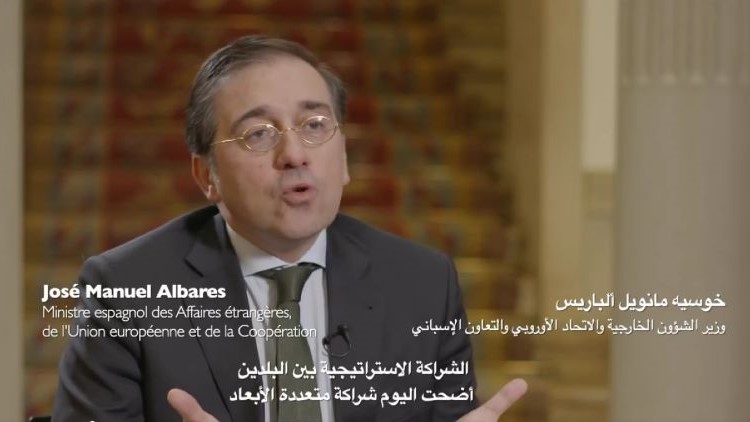Eduardo González
The Minister of Foreign Affairs, José Manuel Albares, has been in Rabat since yesterday for an official visit to Morocco that will include a meeting with his Moroccan counterpart, Nassir Bourita, with whom he will presumably address the major pending bilateral issues, such as customs with Ceuta and Melilla, the airspace over Western Sahara or the delimitation of territorial waters.
Albares’ agenda in Morocco – on his first visit to a foreign country since the beginning of the new legislature in Spain – began yesterday with a working meeting with Moroccan Hispanists and will continue today with an offering at the tombs of Kings Mohamed V and Hassan II, a visit to the Spanish School of Rabat, a meeting with the main actors of Spanish Cooperation, a business event at the Residence of the Spanish Ambassador in Morocco and various meetings with the Spanish media, the Spanish community, Moroccan authorities , NGOs and foreign representatives accredited in Morocco.
In any case, the most important point, by far, will be his bilateral meeting with Nassir Bourita, with whom he will foreseeably address pending bilateral issues, such as the establishment of customs on Morocco’s borders with Ceuta and Melilla (one of the points included in the Road Map adopted in April 2022 in Rabat by the President of the Government, Pedro Sánchez, and King Mohamed VI), the control of the airspace over Western Sahara or the delimitation of territorial waters with the Canary Islands.
During an exclusive interview offered yesterday to the state news agency MAP on the eve of his trip to Rabat, Albares declared that Morocco is “the first priority of Spanish foreign policy.” “With Morocco we really have a partnership of preference, a partnership in which everyone wins,” he continued. “All the measures we undertake together are beneficial for both countries,” he assured.
For all these reasons, Albares stated that “the results of the Road Map are, evidently, very positive.” “We have strengthened the strategic partnership and friendly relations between our two countries have reached a historic level, which is reflected in several areas,” such as economic relations (and he cited, in this regard, the commercial exchanges between both countries, which have reached 20 billion euros), bilateral cooperation in security and judicial cooperation in the fight against mafias dedicated to trafficking in human beings or against terrorism, which “is an example for other countries” and which “has also been consolidated with this new Road Map.”
“The most important thing is that we have strengthened our political and human relations more than ever,” he declared. “These are the foundations on which we are now building this strategic partnership relationship,” he continued. “The human ties that unite the two countries have been strengthened” and, at this time, “more than a million Moroccans live perfectly integrated in our country and contribute to the prosperity of Spain,” said Albares. “These foundations have made the relations between Morocco and Spain one of the densest and richest in the world,” he said.
At the last Spanish-Moroccan bilateral summit, held in Rabat last February (and the first since 2015), both governments signed 19 memorandums of understanding related to educational and business cooperation, investment promotion, water, Spanish language teaching, tourism or ‘green cooperation’, among others.







